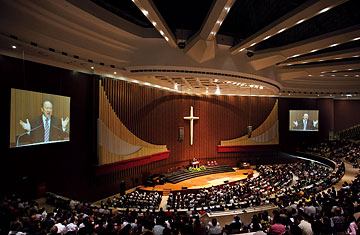
Jakarta's Reformed Millennium Center has seating for more than 4,500 worshippers
(3 of 3)
A few hours earlier, in Jakarta's Kemayoran business district, parishioners gathered in the main auditorium of the Evangelical Reformed Millennium Center, which seats more than 4,500 people. Above the crowds, a pair of giant TV screens broadcast the sermon of Stephen Tong, an Indonesian pastor who conducts weekly services throughout Asia — including Singapore, Malaysia, Taiwan and Hong Kong — and ministers to a regional congregation that has grown to 15,000 in just two decades. Opened in 2008, the church complex cost $30 million to build — and it took 17 years to obtain permission from local authorities. The privately funded church is the largest licensed one in the capital, although an unofficial megachurch with space for 10,000 faithful is nearing completion in a Jakarta suburb. When Tong, 69, raised a crucifix onto the church's massive steeple, worshippers at a nearby mosque complained. Tong didn't back down. "Jakarta has 1.2 million Christians, so a church for 4,000 people is nothing," he says. "We did this all legally, so why can't we put a cross on our church, just like mosques have their symbol?"
Other Indonesian Christians worry that such towering icons will only serve to inflame Muslim sentiment. The dangers are all too real. Take the hundreds of students from the Arastamar Evangelical School of Theology, who staged the November sit-in. They were subsisting in refugee-like conditions, sleeping on thin mats in an abandoned Jakarta building with no electricity or running water. Before that, the beleaguered students lived for months in a park, 35 to a tent. Yet on the outskirts of east Jakarta, the Christian college actually had a handsome campus. In July 2008, hundreds of Islamic extremists crowded the school's gates, accusing students of proselytizing among the local Muslim community — a charge the institute's leaders deny. When three students tried to escape, thugs threw acid in their faces. With local government officials advising the student population to decamp because of continuing danger, Arastamar officials had no choice but to accept the government's proposal for makeshift housing. "How can you say there is true freedom of religion here if things like this can happen to us?" asks school principal Jusup Lifire.
Muslim converts to Christianity are also targets, their apostasy viewed by some radical Islamic scholars as deserving of execution. Syaiful Hamzah grew up as the madrasah-attending son of a Muslim family in Jakarta that helped build the neighborhood mosque. But while working in eastern Indonesia's Maluku archipelago, which has a substantial Christian population, he was swayed by Evangelical teachings. By 2000, he had been baptized at a Pentecostal church and returned to Jakarta to begin theological studies. His family cut him off; one brother threatened to burn his house down. Undeterred, he began lay-preaching to a house-church congregation in his modest home near Jakarta's port. In 2008, a mob armed with clubs showed up and demanded Syaiful stop. He shuttered his church but still guides Muslim converts to Christianity, the number of which he says is growing, in part, because of the terror attacks unleashed in Indonesia in the name of Islam. "So many have converted," he says, "but they are afraid to say so publicly because Muslims will harass them."
The numbers of converts may not be as high as Islamic groups fear. Some so-called converts were Christians all along. In the 1960s, a government anticommunist drive forced each citizen to pick a religion for inclusion on their national ID card. (Suspected communists were quick to pick a religion to convince authorities they were not atheist Marxists.) Worried about future persecution and loath to give up the chance for certain career opportunities reserved for Muslims, some Christians chose Islam for their ID cards, even though they quietly kept going to church. Now they're officially switching to their true religion, seeing safety in growing numbers. Another significant group of Indonesian converts to charismatic sects is ethnic Chinese. But they are abandoning Chinese religions or mainline Protestantism, not Islam.
still, it's hard to ignore the power of a revival like the one held in Temanggung — and easy to understand why some Muslims have reservations about encroaching Christianity. Permission to hold the meeting was only granted after the organizers put up a sign forbidding Muslims from entering. Nevertheless, among the line of sick and suffering hoping to be healed was an elderly Muslim man who others said was blind. After fervent prayers from worshippers in the driving rain, he suddenly blinked and gazed at the gathered crowd. "A Muslim who can now see," said pastor Jason Balompapueng, tears rising in his eyes. "It is a miracle." The faithful urged the tottering man onstage to bear witness to his regained sight. As the man clambered up the stairs, he removed his peci, an Indonesian fezlike hat often associated with Islam. A visiting minister from Jakarta blessed him. Another soul was saved, the Christian pastor rejoiced. Tomorrow, he vowed, there would be more.
—With reporting by Jason Tedjasukmana / Jakarta
